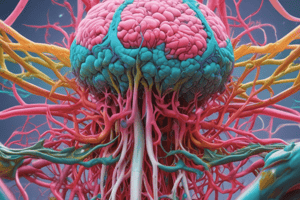Podcast
Questions and Answers
Which of the following is NOT a function of the lymphatic system?
Which of the following is NOT a function of the lymphatic system?
- Filtering lymph fluid from the tissue and blood capillaries
- Transporting plasma proteins, bacteria, and fat
- Transporting red blood cells (correct)
- Transporting excess fluid and protein back into the blood circulation
What anatomical differences exist between lymphatic and blood vessels?
What anatomical differences exist between lymphatic and blood vessels?
- Lymphatic vessels carry lymph, while blood vessels carry oxygenated blood
- Lymphatic vessels have valves, while blood vessels do not (correct)
- Blood vessels have blindend lymph capillaries, while lymphatic vessels do not
- Blood vessels have thinner walls than lymphatic vessels
What is the function of lymph fluid in the lymphatic system?
What is the function of lymph fluid in the lymphatic system?
- To return excess fluid and protein into the blood circulation
- To serve as a medium for immune cells and proteins (correct)
- To carry red blood cells
- To transport oxygen to the cells of the body
Which organ is NOT considered part of the lymphatic system?
Which organ is NOT considered part of the lymphatic system?
What does the lymphatic system transport besides lymph fluid?
What does the lymphatic system transport besides lymph fluid?
Which statement best describes the formation of lymph?
Which statement best describes the formation of lymph?
Which component is NOT part of the lymphatic system?
Which component is NOT part of the lymphatic system?
What is the primary role of lymphocytes and macrophages in the lymphatic system?
What is the primary role of lymphocytes and macrophages in the lymphatic system?
What is a distinguishing feature of lymphatic vessels compared to blood vessels?
What is a distinguishing feature of lymphatic vessels compared to blood vessels?
Which type of fluid does the lymphatic system transport?
Which type of fluid does the lymphatic system transport?
What happens to excess fluid and protein in the interstitial fluid compartment?
What happens to excess fluid and protein in the interstitial fluid compartment?
Which organ in the lymphatic system plays a significant role in filtering out old or damaged red blood cells?
Which organ in the lymphatic system plays a significant role in filtering out old or damaged red blood cells?
Which of the following is a characteristic of lymphatic capillaries?
Which of the following is a characteristic of lymphatic capillaries?
What is the main function of the spleen?
What is the main function of the spleen?
Where are lymphatic cells found?
Where are lymphatic cells found?
What is a characteristic of lymph nodes?
What is a characteristic of lymph nodes?
Where are lymph nodes mainly distributed in the body?
Where are lymph nodes mainly distributed in the body?
Which statement about lymphatic ducts is accurate?
Which statement about lymphatic ducts is accurate?
Which is true about lymphatic capillaries compared to blood capillaries?
Which is true about lymphatic capillaries compared to blood capillaries?
What tissues do not contain lymphatics?
What tissues do not contain lymphatics?
Where are deep neck lymph nodes located?
Where are deep neck lymph nodes located?
Flashcards are hidden until you start studying
Study Notes
Lymphatic System Functions
- The lymphatic system transports lymph fluid, proteins, and fats.
Lymphatic vs. Blood Vessels
- Lymphatic vessels have thinner walls, fewer muscle layers, and less elastic fibers compared to blood vessels.
- Lymphatic capillaries have larger pores, allowing for greater permeability.
Lymph Formation
- Lymph forms from interstitial fluid that enters lymphatic capillaries.
Lymphatic System Components
- The lymphatic system consists of lymph vessels, lymph nodes, lymphoid organs (e.g., spleen, thymus), and lymphoid tissues (e.g., tonsils).
- The lymphatic system does not include the pancreas.
Lymphatic System Cells
- Lymphocytes and macrophages play a crucial role in the immune response, defending against infections and diseases.
Lymphatic Vessels
- Lymphatic vessels are more permeable and have thinner walls than blood vessels.
- Lymphatic vessels transport lymph fluid, proteins, and fats.
Interstitial Fluid
- Excess fluid and protein in the interstitial fluid compartment are transported back to the bloodstream via the lymphatic system.
Spleen Function
- The spleen filters out old or damaged red blood cells from the bloodstream.
Lymphatic Capillaries
- Lymphatic capillaries have larger pores, allowing for greater permeability.
Lymph Nodes
- Lymph nodes filter lymph fluid, trapping pathogens and activating immune responses.
- Lymph nodes are mainly distributed in the neck, armpits, and groin.
Lymphatic Ducts
- Lymphatic ducts drain into the subclavian veins, returning lymph to the bloodstream.
Deep Neck Lymph Nodes
- Deep neck lymph nodes are located along the internal jugular vein.
Studying That Suits You
Use AI to generate personalized quizzes and flashcards to suit your learning preferences.





